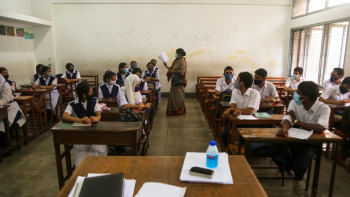Is it too easy to become a professor in Bangladesh?

A leading national daily recently ran a lead story on the inverted pyramid of academic ranks of university teachers or the UGC prescription on the teachers' workload calculation. The headline read, "Many professors, few lecturers." The story based itself on UGC reports to estimate that there are 4,528 are professors, 2,657 associate professors, 5,283 assistant professors, and 2,672 lecturers in 53 public universities across Bangladesh. At Dhaka University, there are 2,234 teachers in 83 academic departments under 13 faculties and 12 institutes. Of them, 871 are professors, 610 associate professors, 426 assistant professors, and 327 lecturers. The situation is similar in other public universities.
In an ideal world, there should have been more lecturers, who would get their PhDs before being moved on to the next level. The academic rank diagram needs to look like a pyramid where few professors are located at the apex. A top-heavy administration is never a healthy sign for any institution, and my comments may sound smug, made by someone who has made it to the top. The reality is the provision of restructuring has allowed the universities to reshuffle the posts in which they were initially recruited. The number that you see at the top is in most cases designated for a lecturer, and unless someone retires at the top, the scope to recruit a new lecturer is blocked. The system has been so bundled up that there is hardly any differentiation between a lecturer and a professor. In my department, I have the same workload as that of a lecturer: we teach the same number of courses, have the same number of students in tutorial groups, and act in the same number of exams and other committees. The recent proposal of the University Grants Commission (UGC) to assign workload is a welcome suggestion.
The problem lies not in quantity, but the quality of recruitment and promotion. More importantly, do we know the scope of a university teacher, and why it is different from other professions? I don't think even many of my colleagues know, or want to know, the answer. The autonomy promised under the University Act, 1973 provides some flexibility that allows teachers to benefit from restructuring. But it also paved the way for some wrong perceptions about and apathy towards the freedom enjoyed by a university teacher.
Our public university system was modelled after the British system, which is very conservative in promoting professors. In contrast, the American model involves an "up or quit" style in which teachers are expected to perform for their promotion regularly. They need to "publish or perish"; they need to bring in research funds to pay for their salaries and/or arrange the tuition fees for their research graduates. Failure to do so will expose the weakest link for an inglorious "goodbye." This is the neoliberal model that is being applied by some of our private universities. Gone are the days of a lacklustre professor that The Economist described in a story in 1987. For the magazine, tenure-track are those teachers on a permanent post who "think (or idle) in ill-paid peace, accountable to nobody." There used to be some truth in it. Henry Rosovsky, dean of the Faculty of Arts and Sciences at Harvard University, writes in his thought-provoking "The University: An Owner's Manual" that one "critical virtue of academic life… is the absence of a boss" (163). Rosovsky elaborates that while working as a dean, he had to take orders from the president of the university (i.e. the vice-chancellor), but as a professor, he "recognised no master save peer pressure, no threat except, perhaps, an unlikely charge of moral turpitude. No profession guarantees its practitioners such a combination of independence and security as university research and teaching" (164).

Under the 1973 act, a university teacher can lose their job only due to "moral turpitude" or "insanity." This freedom has allowed many of us to abuse the system, making us susceptible to public scorn. The allegations are serious: one can become a professor simply by dint of one's service length and required number of publications in "trash" journals. Lately, universities have restricted the number of journals for promotional purposes. As the acting chair of the UGC has said, "We cannot change what has been done. But we will make a fresh start."
The most important change that we need involves transparency and accountability in governance. We need to nurture meritocracy without political or personal consideration. I don't think when I was recruited as a university lecturer, there was any political witch-hunting. My dean assured me that with my rare First Class, I did not need to tag along with any faction. The freedom that I have practised throughout my 29-year-long career stems from that single dose of confidence. The excellence that I experienced while pursuing my second MA and PhD on both sides of the Atlantic made me rethink my academic designation. I realised I should not have joined the university or got my promotion before completing my doctoral research.

Most of our universities started as teaching universities, and are only recently feeling the pressure of increasing their research portfolios to be benchmarked against international rankings. A teacher is no longer expected simply to "confine to the transmission of received knowledge to generations of students" (ibid. 85). There has to be an ideal intellectual balance between teaching and research. It is only prudent to follow some of the best practices to regain some of the lost glories of the teaching profession. The first of those is to earn credibility before our owners: the taxpayers. That can be done only if the system is transparent and competitive.
In India, for instance, they have set the National Eligibility Test (NET) or the State Level Eligibility Test (SLET) as the minimum eligibility condition for recruitment and appointment of assistant professors in universities, colleges and institutions. Only a candidate with a PhD can be exempted. In Sri Lanka, an assistant professor with a PhD must teach for six years before becoming a professor. In the Philippines, teachers are given three years to receive tenure after their initial hire. Otherwise, they cannot continue in the same university. Singapore universities have adopted a hybrid of US and British academic ranks. They hire assistant professors on term contracts, while associate professors and professors may be appointed either with tenure or on term contract. Only through high-quality educational and research activities are they considered for the top two ranks. They hire teachers in three tracks: education, research, and practice. Thus, they do not pit a science faculty teacher against someone from fine arts. They do not have a one-size-fits-all system to measure the expertise of their faculty members.
Unfortunately, in our country, an aspirant teacher who is still in his first year calculates who is going to be the department head at the time of their graduation, which political party is likely to be in power, and which thesis/lab supervisor has the political say or the regional connectivity. This is not the freedom that Rosovsky mentions. It is precisely such abuse of freedom that gets the most public traction. Hence, we hear about teachers acting like party cadres, VCs recruiting their wives, selling faculty and admin posts to the highest bidders, and victimising and stigmatising candidates for donning adversary colours.
As university teachers, we need to realise that the freedom that has been entrusted with us comes from the love of the people and their hard-earned taxes. Their sweats have no party colour. They have given us the duty to educate their children. And for that, there should be no compromise. We need to up our game or quit. The challenge for us is to make every position count for its quality. Once we do that, the numbers will automatically fall into place.
Dr Shamsad Mortuza is a professor of English at Dhaka University.

 For all latest news, follow The Daily Star's Google News channel.
For all latest news, follow The Daily Star's Google News channel. 











Comments